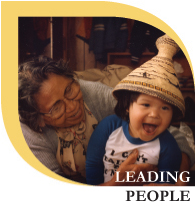Credible Champion

A Credible Champion shows courage and conviction in advocating for change for the betterment of Indigenous peoples. This means stepping forward, from a place of respect and knowledge, to name needed change and to champion it. This may mean challenging current business practices and attitudes. A credible champion is admired and respected by Indigenous peoples and BC Public Service employees, is deeply knowledgeable in the culture of those with whom s/he works, and demonstrates outstanding performance as identified by Indigenous people and the public service. A credible champion remains self-aware and maintains effective relationships.
Why is This Important?
For years I've worked with First Nation, Métis and urban Aboriginal leaders and organizations, and I see the impact of the last 150 years of history on these populations. Yet too often our policies, programs and services are not designed to best address the challenges and opportunities.
"To truly engage with respect, so that new directions can be co-developed and capacity in these communities built in sustainable ways"—this is a vision grounded in what the research tells us works. It takes persistence and a long-term view. We are setting the stage for the next generations so that improvements are realized over time. We have to balance government's goals with those of our partners in ways that become "win-win."
We must work with integrity, persistently finding innovative solutions, showing optimism in our willingness to listen and try new things, communicating why it's important to do things differently and bringing the stories of success. We have to cultivate the fundamental understanding that these are unique populations with special status under the Canadian Constitution, who cannot be minimized as simply another stakeholder group. Success in closing the socio-economic gaps will only occur when we're all working to engage in very different ways. I think that's what being a credible champion is all about.
Arlene Paton, Assistant Deputy Minister
Ministry of Health, Victoria
Demonstrates the Behaviour When
- Readily shares knowledge
- Operates from a position of possibility rather than from one of risk avoidance
- Balances the activities of championing with work expectations and deliverables
- Asserts the primary position of Indigenous peoples upon the land relative to all later arrivals
- Demonstrates respect in all advocacy and championing activities
- Immerses oneself in Indigenous cultures and communities
- Models openness to diverse perspectives and respect for diversity in culture
- Seeks knowledge and feedback from Indigenous people for appropriate advocacy
- Recognized as credible and well respected across cultures
- Challenges behaviours, practices and policies while preserving healthy relationships with individuals
- Supports others in their enthusiasm to learn, improve and excel in Indigenous relations
- Remains aware of the strategic perspective during individual conversation
- Provides a credible business case or motivation for change
- Actively supports the advocacy and championing activities of others
- Recognizes and analyzes power imbalances and institutional discrimination and facilitates change
- Actively lobbies to empower a critical mass of people to accept change
Needs Development When
- Defends the status quo regardless of the information
- Avoids taking a risk when it feels daunting
- Acts without awareness of impact
- Waits for changes to be mandated and then complies
- Takes a position of neutrality when advocacy and championing are indicated
- Waits for others to champion and then follows
- Lets personal beliefs get in the way of hearing the perspectives of others
- Demonstrates upset or anger when challenged
- Is impatient with perceived resistance to change
- Advocates for oneself and one's advancement rather than for the betterment of Indigenous peoples
- Uses position of champion to further personal agenda
- States knowledge of what is "right"
- Shows inflexibility
- Alienates others when championing
- Loses sight of long-term implications when championing
